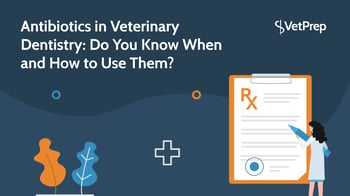If you decide to work in small animal practice after vet school, you will likely see a wide variety of dentistry setups during your interviews. Some practices may have state-of-the-art dental suites, while others may expect you to section multi-rooted teeth with a Dremel® on the treatment table. (I wish I was kidding!)
Follow Us
Cathy Barnette

Recent Posts
Essential Equipment for High-Quality Veterinary Dentistry
Topics: Equipment
5 Tips for New Grads to Prevent Dental Extraction Complications
Although dental extractions are a relatively routine, everyday part of general practice, they are not without risk!
And, if you’re like most vet students, you probably didn’t get a lot of exposure to dentistry and extractions while you were in vet school.
Antibiotics in Veterinary Dentistry: Do You Know When and How to Use Them?
If you talk to a group of veterinarians that has been in practice a while, you will likely hear a wide variety of opinions surrounding the use of antibiotics in veterinary dentistry. Some veterinarians rarely use systemic antibiotics, while some veterinarians use them in the majority of their dental procedures.
As our understanding of veterinary dentistry has gradually expanded over time, trends in antibiotic usage have undergone a number of shifts.
When should you prescribe systemic antibiotics?
Topics: Veteirnary Dentistry, Dental Care, Dental Disease
Top 5 Canine Congenital Heart Diseases: Diagnostic Tips for Vet Students
Congenital heart disease is not all that common in dogs; in fact, studies estimate that fewer than 1% of dogs are affected by congenital heart disease.1 Although these conditions are uncommon, they can have a significant impact on affected dogs. Therefore, it’s important for you to keep these conditions on your radar when seeing young puppies for new pet exams and wellness visits.
The five most common congenital heart defects in dogs, in order of decreasing frequency, are patent ductus arteriosus, pulmonic stenosis, aortic stenosis, persistent right aortic arch, and ventricular septal defect. You are likely to see at least some of these conditions over the course of your career; having a basic understanding of clinical signs and diagnostic workup can help you diagnose and treat these puppies as quickly as possible.
Topics: Heart Diseases, Diagnostic Tips, congenital heart diseases, Canine Heart Diseases






